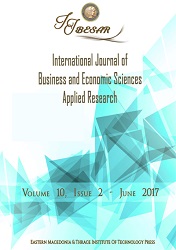The Dynamic Effects of Oil Price Shocks on the Economies of the Twelve Major Oil Exporting Countries from 1970-2013: The Role of Political Economy Factors
The Dynamic Effects of Oil Price Shocks on the Economies of the Twelve Major Oil Exporting Countries from 1970-2013: The Role of Political Economy Factors
Author(s): Sinem SonmezSubject(s): Energy and Environmental Studies, Economic history, International relations/trade, Political economy, Post-War period (1950 - 1989), Transformation Period (1990 - 2010), Financial Markets, Fiscal Politics / Budgeting
Published by: Τεχνολογικό Εκπαιδευτικό Ίδρυμα Ανατολικής Μακεδονίας και Θράκης
Keywords: Macroeconomics; Output; Exchange Rates; Fiscal Policy; Oil Prices; Oil Exporters;
Summary/Abstract: This paper examines whether the economies of oil-exporting countries respond to oil shocks differently, depending on the country’s political economy factors, such as regional economic alliance, stage of economic development, and the exchange rate regime, using a structural Vector Error Correction Model (VECM). The sample countries covered in this study include all the major twelve oil exporters: the GCC countries (Bahrain, Kuwait, Oman, Saudi Arabia, UAE, and Qatar)1 and the non-GCC oil exporters (Iran, Nigeria, Norway, Canada, Russia and Venezuela) for the 1970-2013 period. Design/methodology/approach: To achieve the above, this paper employs a four-variable restricted structural Vector Error Correction Model (VECM) with oil prices (exogenous) and a set of endogenous variables, including GDP, M2, and Inflation for the 1970-2013 period, with a co-integrating relationship that varies from 1 to 2. Both Johansen Cointegration Test and Granger Causality Tests have been applied. To eliminate the effects of a contemporaneous correlation of the residuals with the regressors, the errors are orthogonalized by a Choleski decomposition. Finding: The political economy characteristics of countries explain why the economies of oil exporters either with fixed or managed floating exchange rates behave differently than those economies with floating exchange rates. Money is endogenous in oil-exporting countries with fixed or managed floating exchange rates, but not in oil-exporting countries with floating exchange rates. The evidence found in this paper suggests that the fixed exchange rate regime of the GCC countries is not effective in tamping down inflationary pressures, as planned. There is a strong positive effect of oil price shocks on the foreign exchange reserves of the GCC countries, whereas the effect of oil price shocks on foreign exchange reserves has been rather non-existent for the non-GCC oil exporters with floating exchange rates. Research limitations/implications: The data span is restricted by data availability, the study could ensure for more robustness and better confidence with quarterly data, but most of the variables for countries are reported annually, except for Canada, Russia, and Norway. Originality/value: This paper separates oil exporters into two distinct categories, the GCC countries and the non-GCC oil exporters. To my knowledge, this has not been done before in the academic literature. Unlike the GCC countries, the non-GCC oil exporters do not participate in a common political alliance or an economic union. Their economies are diversified and less dependent on oil exports. This study shows that the political economy characteristics play a large role in explaining why the economies of oil exporters with either fixed or managed floating exchange rates behave differently than the oil exporters with floating exchange rates.
Journal: International Journal of Business and Economic Sciences Applied Research (IJBESAR)
- Issue Year: 13/2020
- Issue No: 1
- Page Range: 29-51
- Page Count: 23
- Language: English

